Great Britain
Posted June 2022: British Real Estate has been POORLY performing since the 1950s. Only the FIAT price is higher. Expressed in Real Money, the performance is ZERO to NEGATIVE.
Posted August 2013 - No relief for Irish Real Estate either! [click on the picture to view the video]

Posted July 14, 2009 - no recovery for British Real Estate until 2035!
When might house prices bottom? The future won’t be exactly like the past, but after the Lawson boom, it took 14 quarters for house prices to trough. If that pattern were repeated, house prices would bottom this time late in 2010 – which seems plausible – and return to their 2007 level by 2016. History, not having been learned from, would have repeated itself.
According to our analysis, we expect British Real Estate to bottom, not before 2014. Worse is that we expect long term interest rates to soar because of hyperinflation. This will impact Real Estate in a negative way.
Posted May 1st, 2009
No light in the tunnel for British real estate yet.
Expressed in Gold (or Real Money) it gets even worse: the slide started in 2005
Updated January 10, 2009
House sellers drop asking prices by £17,000 House sellers across Britain have been forced to drop their asking prices by an average of £17,000 in the last two weeks.
HBOS - Britain's Biggest Mortgage Bank. The HBOS Share price has crashed by over 94%, and is indicative of the severe nature of the current housing bear market, trading at just 73p the once-mighty HBOS has now become another penny stock with the value of shareholdings further diluted via state capital injections to keep the zombie bank from flat-lining.
Updated November 28, 2008
Where is the idiot who said Real Estate would never crash? Almost 1m homes are standing empty across the United Kingdom, and the vast majority – more than four out of every five – are believed to be owned by private landlords. Some landlords might be actively trying to sell, or planning a refurbishment, while many have simply given up on their empty properties. Even the City who traditionally used to be safe heaven is affected by the crisis as Banks and Financials are Thousands of City workers axed in jobs bloodbath.
Real Estate is a HOCG (high order capital good) and will suffer as long as the misallocated funds haven't been cleaned out of the economy and the financial system. This is a GLOBAL phenomenon and all Western countries are affected.
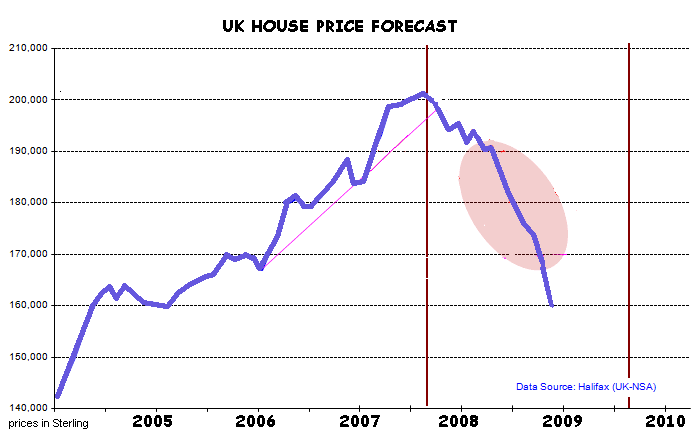
Posted October 30, 2008
 UK house prices likely to be hit by forced sellers
UK house prices likely to be hit by forced sellers
The fall in house prices is likely to continue next year as the looming recession forces some homeowners into selling their properties, building society Nationwide said today.
House prices fell for the twelfth month in a row in October, according to the building society, and are now 14.6pc lower than a year ago. This month's 1.4pc fall means the average home has now had £27,000 wiped off its value in the last twelve months.
The number of completed housing sales has tumbled to its lowest level since the Nationwide series began in 1974, as sellers refuse to lower asking prices and buyers remain reluctant to trade because they don't believe the market has found a bottom. However, Nationwide said that as the economic downturn deepens, sellers were likely to have to lower their asking prices.
"As the economy weakens further there is likely to be more movement on asking prices as sellers adjust to the prevailing conditions and reassess their own needs. Some may choose not to sell, after all, thus reducing supply, but others will adjust their prices accordingly," said Fionnuala Earley, Nationwide's chief economist.
Posted September 3, 2008 - UK house prices are falling at the fastest rate on record, Halifax says By Emma Thelwell
| "Where is the idiot who shouted Real Estate Prices NEVER comes down"? |
 UK house prices have fallen almost 13pc in the last 12 months, the steepest decline since records began. Average prices dropped 1.8pc in August, dragging the annual rate of decline down to 12.7pc, according to the latest monthly report from Halifax.
UK house prices have fallen almost 13pc in the last 12 months, the steepest decline since records began. Average prices dropped 1.8pc in August, dragging the annual rate of decline down to 12.7pc, according to the latest monthly report from Halifax.
Martin Ellis, the chief economist at Halifax, said: "The pressure on householders' income, together with the reduction in the availability of mortgage finance due to the global financial markets crisis, is resulting in both lower property prices and activity levels."
Halifax has been compiling records since 1983 and expects prices to fall as much as 20pc by the end of next year. Click here for more...
The average UK home is now worth £174,178
Posted July 31, 2008
House prices have tumbled 8.1pc in the past year. The average property has shed almost £17,000 in value since prices peaked last October, coming down from £186,044 to £169,316 - the lowest level since August 2006.
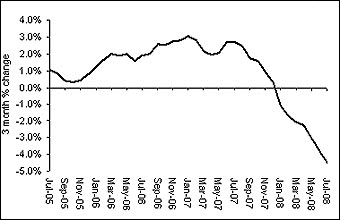
Posted July 22, 2008
For non-believers, it becomes apparent that this ain't the same as in the 1980s. The Real Estate recession is not anymore a small or larger correction that is to be followed by a renewed upwards to jump. Miss Real Estate Goldilocks has definitely passed away. She also left Freddie Mac and Fannie Mae behind. What we see now, resembles more and more to the Great Depression. As I have written a couple of times, Fortunes to be made and Fortunes to be lost...got Real Estate? want to buy more Real Estate? Better think twice! In the UK the rate of descent on an annualized basis now extends to -11%.
Slide-in house prices is the worst since the Great Depression - By Edmund Conway - Last updated: 1:36 am BST 11/07/2008
Britain is now in the midst of the worst housing slide since the Great Depression, economists declared after house price inflation dropped to the lowest level since comparable records began. Figures from Halifax, the UK's biggest mortgage lender, showed house prices have fallen by 8.7pc in the year to June, confirming that the property crunch is more severe than the last housing crash in the early 1990s. Hours before, the Bank of England voted to leave rates unchanged at 5pc.
The Halifax figures - which showed prices dropped 2pc last month, following a 2.5pc slide in May - indicate that the scale of the crash now rivals the falls in UK home values in the 1930s. In the three months to June, house prices were 6.1pc lower than the comparable period last year - described by Halifax as the "annual change".
House prices have never fallen by more than 10pc over a year in recorded history, except in 1931, when Britain left the gold standard.
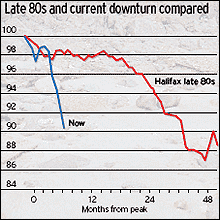 David Owen of Dresdner Kleinwort said: "Back then, sterling had been ejected from the gold standard and the currency collapsed, and, although this helped exports, house prices collapsed. What we are seeing now has some parallels with then."However, it is a very unreal situation because this is happening without there being a major recession, and we haven't seen distressed selling, nor a significant increase, yet, in unemployment."
David Owen of Dresdner Kleinwort said: "Back then, sterling had been ejected from the gold standard and the currency collapsed, and, although this helped exports, house prices collapsed. What we are seeing now has some parallels with then."However, it is a very unreal situation because this is happening without there being a major recession, and we haven't seen distressed selling, nor a significant increase, yet, in unemployment."
The Bank of England reported recently that the number of mortgages being approved for housing purchases dropped to 42,000 in May - the lowest level since comparable records began in 1993 and down 64pc on the previous year.
Alex Vitillo, of Fathom Consulting, said that the downturn was already more severe than the early 1990s, where, according to figures from Nationwide, prices dropped by around 20pc over a number of years.
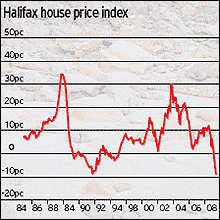 He said: "As the UK housing market downturn gathers pace, it is common for analysts to argue that this downturn will not be as bad as the early 1990s vintage. It looks like it will be worse, perhaps far worse.
He said: "As the UK housing market downturn gathers pace, it is common for analysts to argue that this downturn will not be as bad as the early 1990s vintage. It looks like it will be worse, perhaps far worse.
"The decline is far greater and swifter than anything we saw in the early 1990s. Our modeling work suggests that nominal house prices could fall by another 15pc to 20pc from here," he said, adding that there was a risk of even greater falls.
Economists predicted that, with the economy slowing sharply, it may have to cut interest rates by the autumn. Former MPC member Charles Goodhart warned yesterday that with the economy looking "dire", Britain is now facing a recession.
Prof Goodhart, now at the London School of Economics, said: "Output is going to fall, unemployment is going to rise, possibly quite sharply. It's a horrible situation. "The British economy is getting into quite a recession. I remember when the Queen had an 'annus horribilis,' and this is the annus horribilis for the MPC. "The third quarter will show no growth, maybe even a marginal reduction in output," he said in an interview with Bloomberg Television. "I think it will last rather longer than is going to be comfortable. The situation looks dire."
Michael Saunders of Citigroup said: "The housing market is probably not even close to the bottom, and sizeable further declines in house prices are likely, not necessarily every month, in the rest of this year and in 2009. In turn, plenty more weakness lies ahead for the overall economy as well."
Posted June 23, 2008
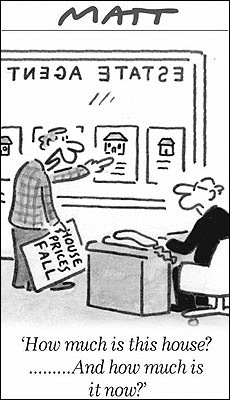
House prices to fall more than 25pc as BBA warns on mortgages
By Edmund Conway, Economics Editor
Last Updated: 11:43 am BST 24/06/2008
House prices are set to lose a quarter or more of their value, experts have warned after a "shocking" fall in property market activity.
The number of mortgages approved by Britain's biggest banks fell last month to the lowest level since records began 11 years ago. Click here for more...
Our opinion: Real Estate prices tend to fall by 75 % from peak to bottom. Assuming we are correct, we have 50 % to go. What the Credit Crunch does not do, will be done by rising interest rates.
Posted June 10, 2008 - The number of houses changing hands has "collapsed" to the lowest level in 30 years, an influential housing market survey shows today.
Job fears as house sales plummet
By Harry Wallop, Consumer Affairs Correspondent - Disposable income falls at the fastest rate since the 1970s - House prices: News, views, and data - RICS UK housing market survey, May 2008 [PDF Format]
The fall in sales far exceeds the depths of the last housing crash in the 1990s and is the lowest since records began in 1978. The average number of houses that estate agents sold in the past three months were 17.4 - almost a third lower than a year ago, says the Royal Institution of Chartered Surveyors (RICS). Its report also says that gazundering, the controversial practice of buyers dropping their offer price after they have agreed to purchase a property, has returned.
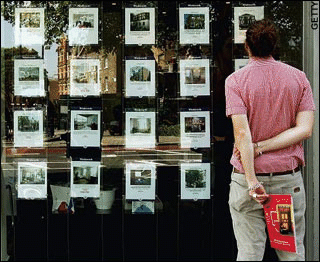 While prices have started to fall in earnest only in the past two months, the report makes clear that the property market is in a dire state. Buyers are refusing, or unable, to hand over any money to purchase a house. "The continuing lack of demand in the housing market is reflected in the collapse in transactions," says the report."
While prices have started to fall in earnest only in the past two months, the report makes clear that the property market is in a dire state. Buyers are refusing, or unable, to hand over any money to purchase a house. "The continuing lack of demand in the housing market is reflected in the collapse in transactions," says the report."
Tim Edmonds, an estate agent, and RICS member said: "Transactions have virtually halted. Where sales have been agreed, it is very difficult to get them through to exchange." Neil Hunt, a Derbyshire-based estate agent, said: "Demand has plummeted to a crisis point with sales at their lowest May level in memory. "An avalanche of job losses in the housing industry is beginning to materialize which could make current media stories look like the good old days."
The credit crisis has pushed up the cost of mortgages and first-time buyers need to find deposits of 10 or even 25 percent to get the best rates from some lenders - equating to more than £30,000. The report comes after economists warned yesterday that the Bank of England may increase interest rates later in the year because of rising inflation. Rates on the swap market - where banks borrow to fund fixed-rate mortgages - jumped yesterday. Those used to fund two-year mortgages rose from 6 percent to 6.3 percent. It was the biggest one-day increase since 1992 and some specialists predict lenders will have to increase mortgage rates as a result.
The drought in housing transactions is starting to cause substantial problems for the economy, the RICS warns, as estate agents, lawyers, mortgage brokers, and removal men suffer their quietest period in a generation. Even during the depths of the housing crash in 1991, agents sold 26 properties in any three-month period - almost 50 percent higher than last month's figure. Jeremy Leaf, a north London estate agent and RICS spokesman said: "House price falls in themselves are awful, but only for those that have bought recently and need to sell.
"However, for the wider market, they are not a problem. What really is serious is when buyers stop walking in through the door." When that happens the whole housing market seizes up and none of the professions can earn a commission. The Daily Telegraph disclosed last month that more than 1,000 estate agent branches had closed since the start of the year. The Centre for Economics and Business Research think-tank predicts that 15,000 agents will lose their jobs this year.
Mr. Leaf said: "The property industry will not be the only casualty in the fall-out from the credit crunch, with the high street and purveyors of a range of household goods, including furniture and white goods, also feeling the pinch. "Construction workers such as plumbers and bricklayers will start to see employment opportunities dry up as the pace of housing transactions continues to abate."
The RICS survey indicates that prices improved slightly last month, with 92.9 percent more surveyors reporting a fall in house prices than a rise, marginally better than April's 94.7 percent. Surveyors in south-east England and East Anglia are unanimous that prices are falling. Agents say that gazundering may send prices down further. Philip Barnett, at Mundy & Co in Lincoln, said: "Gazundering and fall-throughs are now a significant problem showing how inadequate and ineffective were the Government's home buying and selling reforms."
Grant Shapps, the Tory housing spokesman, said: "Families who want or need to move home cannot afford to do so. They are feeling the pinch from food prices and the cost of filling up their car. "If at the end of the month you are feeling very stretched the last thing you can afford to do is move house."
A spokesman for the Department for Communities and Local Government said: "We are well placed to meet the challenges of the global credit crunch, the fundamentals of the economy are sound with low unemployment and historically low-interest rates, and long-term demand for housing remains high. "The issue affecting the market is fundamentally about the supply of credit - a different situation to the early 1990s which was about high-interest rates and unemployment.
©, All Rights Reserved - The contents of this report may NOT be copied, reproduced, or distributed without the explicit written consent of Goldonomic.












